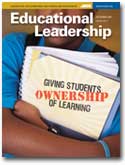ASCD's Push for Healthy Schools Takes Off!
In response to increasingly alarming child health issues—such as obesity and the growing incidence of type 2 diabetes—67 schools across New Mexico will use ASCD's Healthy School Report Card. The report card will measure each school's efforts to promote physical activity, provide nutritious foods, and encourage families' involvement in the health and education of their children.
Research shows direct links between student health and academic progress. About one-quarter of New Mexico students are considered overweight or obese, and increasing percentages are suffering from preventable diseases caused by poor nutrition and sedentary lifestyles. The problem is worse among the state's Hispanic and American Indian students.
Des Moines Municipal School in Des Moines, New Mexico, is one of 11 sites from across the United States and Canada that, as part of a pilot study with ASCD, have been using the Healthy School Report Card to involve their communities in improving student health and academic performance. The school opened a school-based health center last August that provides physical, dental, and mental health care for students, staff, and the surrounding communities.
All New Mexico public schools will begin using the report card within the next three years. Each school's data will contribute to the statewide report card, which will help determine policies and establish programs at the local level. The report card will also help districts and schools meet the state's wellness policy mandate, which requires school health advisory councils to provide twice-yearly data-based recommendations for improving student health.
For more information about the Healthy School Report Card, visitwww.healthyschoolcommunities.org.
Convening All Educators in the Middle East
ASCD Middle East is convening an international conference, "Valuing the Whole Child: Embracing a Global Vision," to be held November 8–9 in Istanbul, Turkey. The conference will connect educators from the region with leading education researchers and school improvement consultants to explore practices and programs that ensure all students are healthy, safe, engaged, supported, and challenged.
The conference will highlight how a broader definition of achievement and accountability can help schools respond to the demands for a highly skilled and educated workforce. Attendees will learn how to assess their schools' professional development efforts and will discover which learning models and practices build instructional capacity that leads to school improvement.
Conference sessions will address learners' holistic as well as academic needs. Sessions will also focus on ASCD's major professional development programs: Differentiated Instruction, Understanding by Design, and What Works in Schools.
Headquartered in Qatar, ASCD Middle East is the first organization of its kind to provide educators in the region with tailored professional development and capacity building. For more information about the conference or about ASCD Middle East, contact Joseph Ghaly, executive director, ASCD Middle East, at jghali@ascdme.org.
Promoting Student Voice
Thanks to an ASCD initiative, Massachusetts is hearing a lot about student voice. First Amendment School graduate Sarah Krongard has met with key stakeholders, students, teachers, administrators, community members, and public officials in the state to raise awareness of this issue. Krongard is developer of the ASCDCommunity Conversations for High School Studentsguide, which promotes student voice and student investment in learning and teaching.
As the state works to develop the whole child, Krongard and Massachusetts ASCD are collaborating to share ASCD's whole child resources with local leaders from vocational high schools to the Department of Education, helping them align around a broader definition of achievement and accountability.
For more information about promoting student voice in the context of the whole child, visit the Whole Child Community Conversations Project at www.ascd.org/communityconversations.
